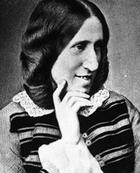
George Eliot, pseudonym of Mary Anne Evans, was born in Chilvers Coton (Warwickshire), on November 22, 1819. His father was a real estate agent. He studied at the local school in Nuneaton and then at a boarding school in Coventry, a training that was rarely given to women at that time. At seventeen, after the death of his mother and the marriage of his older sister, he returned home to care for his father. From then on he was self-taught. His first literary work, in which he worked from 1844 to 1846, was the translation of Life of Jesus, by the German theologian David Strauss. In 1851 he traveled for two years in Europe, and on his return he wrote book reviews for the Westminster Review. Later she was appointed deputy director of the magazine, position that put her in contact with the main literary figures of the time, such as Harriet Martineau, John Stuart Mill, Herbert Spencer or George Lewes. Meet Lewes, philosopher, scientist and critic, was one of the most important events of his life. They fell in love and decided to live together despite the fact that Lewes was married and could not get a divorce. However, Eliot considered his long and happy relationship with Lewes as a marriage. In 1856, encouraged by Lewes, he began writing novels. In his first account, "Amos Barton", published in Blackwood's Magazine in January 1857, two others followed in the same year, which later appeared in a book under the title of Scenes of the Clerical Life (1858). He signed it under the pseudonym George Eliot and kept his identity secret for many years. Among his most famous works are Adam Bede (1859), The mill next to the Floss (1860) and Silas Marner (1861). His travels in Italy inspired his next novel, Romola (1863). Shortly after he wrote his two masterpieces: Felix Holt, the Radical (1866), on British politics, and, above all, Middlemarch (1872), which has been considered by critics as the best novel ever written in English . He would follow Daniel Deronda (1876), a work in which he attacks anti-Semitism and sympathizes with Jewish nationalism. Eliot is considered the most important writer of the Victorian era, and was admired by contemporaries such as Emily Dickinson and later writers such as Virginia Woolf. After the death of Lewes, which occurred in 1878, Eliot retired and stopped writing. In May of 1880 he married John Cross, an American banker who had been a friend of his and Lewes's for a long time, and who would be his first biographer. However, George Eliot died just seven months later, on December 22, 1880, in London.




